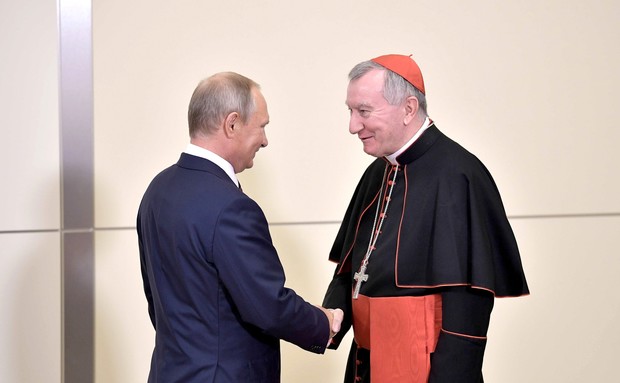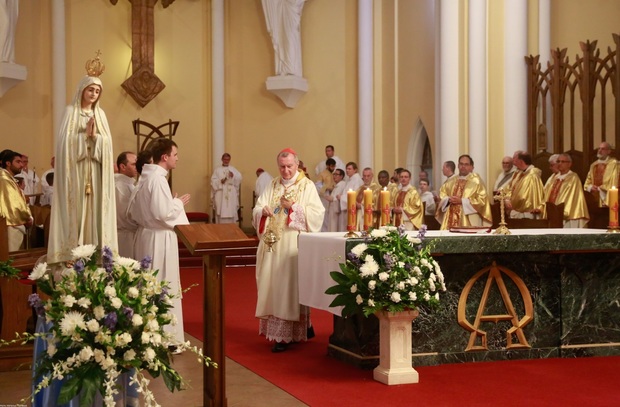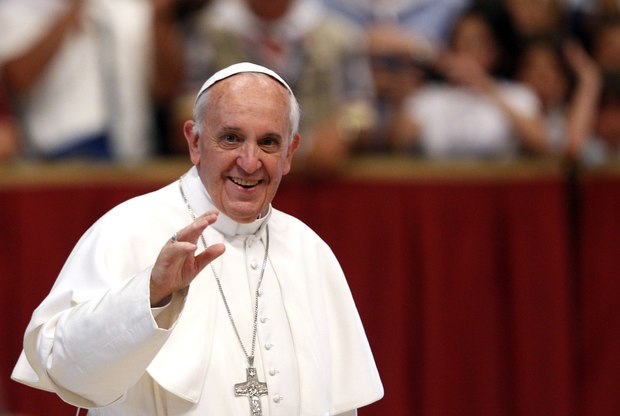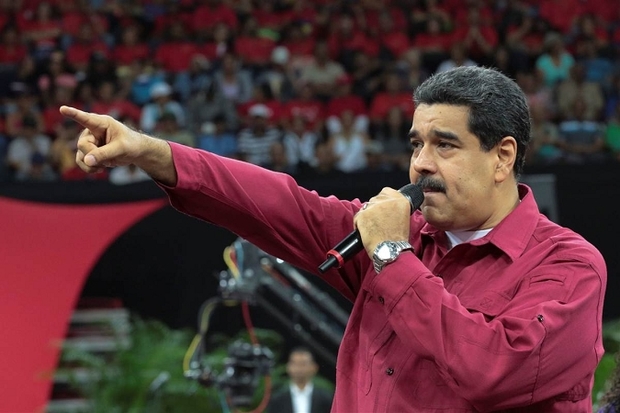Vsevolod Chaplin: ''Russia needs to get rid of the false awe of Vatican’s former power''
Third Roma — Pope’s Throne: pragmatism without awe. Archpriest Vsevolod Chaplin’s column
These days Cardinal Secretary of State Pietro Parolin has arrived in Moscow. The cardinal's visit was accompanied by rumours of a possible visit of Pope of Rome to Russia. Having analysed previous messages from representatives of the Pope's Throne, famous Orthodox priest, Realnoe Vremya's columnist Archpriest Vsevolod Chaplin comes to unnerving conclusions. In an op-ed column written for our online newspaper, he notes what the close cooperation with the head of the Roman Catholic Church is fraught with and what a language the Kremlin should speak with the city state.
Pope Francis in Russia – a done deal?
Cardinal Secretary of State Pietro Parolin's visit to Moscow seems not to have caused great excitement. However, the diplomacy of the Pope's state knows how to wait hoping to win strategic positions instead of instantaneous, rapidly forgotten symbols of ''love and friendship''. It seems that Russian church diplomacy also entreated secular diplomacy, and very Vatican doesn't say publicly about the possible visit of Pope Francis to Russia even if he did not exclude that he would visit both our country and Ukraine. There was held a special press conference where representatives of the Department of Foreign Church Affairs of the Moscow Patriarchy Stefan (Igumnov) and Secretary General of the ''catholic'' episcopal conference in Russia Priest Igor Kovalevsky denied the Pope's plans to visit the Russian land. However, Orthodox opinion journalist Igor Druz, political emigrant from Ukraine, reminded immediately how same Father Stefan denied the plans for holding a meeting of the Patriarch and Pope two weeks before it was in Havana. Of course, the presumption of distrust, in this case, will remain absolute forever.
I suppose the idea of the Pope's visit anyway existed and was carefully discussed before Parolin's arrival. However, both the secular and church officials understood: such a visit is fraught with the century-old break in the Russian Orthodox Church. The problem is not only that many people there don't think current supporters of Vatican are Christians, especially ''Catholics'' using this word (''katholikis'' in Greek) while speaking about Orthodox Christians only.

''Cardinal Secretary of State Pietro Parolin's visit to Moscow seems not to have caused great excitement. However, the diplomacy of the Pope's state knows how to wait hoping to win strategic positions instead of instantaneous, rapidly forgotten symbols of ''love and friendship.'' Photo: kremlin.ru
The problem of aggressive expansion of Uniatism – a system that hides loyalty to Roma behind ''Orthodox'' customs – is not solved but is aggravating. Today the union is widely spread in the east and south of Ukraine where it never existed. It is also established via chaplains in armed forces of this country – while priests of the canonical Ukrainian Orthodox Church are systematically not allowed there. The union is trying to expand in Belarus. A union congress of the Russian Byzantine Catholic Church was held in July – quite a marginal structure but that in its resolution already intends ''to hold regular conferences of priests, care about education and formation of seminarians, <…> regulation of the admission of new members, establishment of closer links between churches inside and outside Russia and raising money''. It is curious that names of two former employees of the Department of Foreign Church Affairs are mentioned among the congress participants, one of whom switched to the union a long time ago. And it seems that the second one is at the crossroads.
Vatican's attempts
A calm mission among the pro-Western Russian intelligentsia is under way – as being responsible for negotiations with Vatican in the past, I advised those diplomats and clerics to differentiate Catholics and ''Orthodox Protestants''. The latter came to churches in the 90s and 2000s having said goodbye to hateful Russia and its ''obsolete'' belief. However, they did not become a tower of strength: the majority went to the West and lead there a life like plants, others went to wander spiritually further – Protestantism, Judaism and more often to passive liberal disbelief.
Having preached a sermon in front of the parishioners of the Cathedral of the Immaculate Conception in Moscow, the head of the Vatican state made a hint that they should not express the provocative activity of missionaries. Having remembered an expression of Catholic activist of the 19 th century John Henry Newman ''delicate light'', Cardinal Parolin said that we should consider belief as our own lifestyle that changed after the meeting with Christ, not as concern about the contemplation and reinforcement of some institute or multiplication of some group. In brief, Russian supporters don't need to insist on the expansion of the ''Catholic'' community.

Cardinal Parolin said that we should consider belief as our own lifestyle that changed after the meeting with Christ, not as concern about the contemplation and reinforcement of some institute or multiplication of some group. In brief, Russian adepts don't need to insist on the expansion of the ''Catholic'' community. Photo: cathmos.ru
However, on Tuesday, Parolin stated he saw ''positive dynamics'' in development of the idea of Pope of Roma Francis' visit to Russia. But at the same time he presupposed – in the best traditions of Vatican carefulness – a big job needs to be done before it happens. Take it any way you want.
It is interesting that on 24 August the Cardinal lifted a veil over one part of the negotiations that was not actively covered while making conclusions to the visit: he said to the Russian officials that there were few Catholic churches in Russia. The Vatican cardinal told that Catholic communities have serious difficulties in some places because they don't have a place of worship. There are communities that gather in flats. If there are 10-20 parishioners, why can't they gather in a flat? Yes, it would be good to return historical Catholic churches, including one that went through privatisation in Moscow, just for justice. But in most cases, ''flat'' communities are located in the cities where Vatican historically has not had a parish. Did the Cardinal insist on construction of new Catholic churches ''instead of'' smiles and bringing relics?
Putin did not invite Francis to visit Russia via Parolin (in 2002, it was told about an invitation of Pope John Paul II ''at any time'' if the Orthodox Church agrees). However, the visit of the state secretary was at the invitation of the Russian state. Contacts with Vatican are considered important in many countries – but if it is natural for the Catholic world, the special attention to the ''Holy Throne'' can be called tribute of inertia in the Orthodox one.

''Contacts with Vatican are considered important in many countries – but if it is natural for the Catholic world, the special attention to the ''Holy Throne'' can be called tribute of inertia in the Orthodox one.'' Photo: nabludatel.net
''They need to require reciprocal concessions to conserve the union''
For the leading bureaucracy of Brussels and Strasburg, Vatican is an unforgivable historical enemy, and it can't be an intermediary in relations with Russia. In case of Trump's administration, such mediation is nonsense. The help of religious communities to suffering people in Syria or Iraq turns out to be more symbolic. And for serious negotiations, they need to establish contacts with not only Assad and religious circles that support him but also the opposition, including that is psyched up for stricter pursuing Islamic rules or fragmentation of Syria. Not all these people are terrorists. And efforts of traditional Orthodox and Islamic leaders, Erdoğan, King of Jordan Abdullah, Kurdish organisations, Israel, same Vatican, in the end, need to be united for talking to them. And Vatican doesn't need to play a major role that it has never played in Near East.
The topic of Ukraine also requires bringing not only the heads of DPR and LPR but also those political forces whose leaders turned out in prison or emigration for talk – their return to the Kyiv politics needs to be the main condition to accept the political part of the Minsk process. Otherwise, the world based on confirmation of injustice will never be stable. In this case, Vatican is unlikely to be a tower of strength: it doesn't have access to pro-Russian forces in Ukraine and among political emigrants, while everyone remembers the key role of the Uniates at Maidan well.
Finally, Venezuela – Parolin's expression of problems there in Moscow can be explained because Nicolas Maduro supports a victory while the ''Catholic'' hierarchy and very Vatican bet on his takeover. In this case, they need to require reciprocal concessions to conserve the union, not just make political presents.

''Finally, Venezuela – Parolin's expression of problems there in Moscow can be explained because Nicolas Maduro supports a victory while the ''Catholic'' hierarchy and very Vatican bet on his takeover.'' Photo: tbn-tv.com
In general, the relations between Moscow and Vatikan should be considered quite pragmatically. At the same time, we should not forget that in Western Europe, at the heart of the historical Roman Church, its successors are rapidly losing momentum. The former economic and political role of Vatican is on the verge of collapse, its bureaucracy is becoming small – Parolin is one of the latest deep and independent figures. The internal discontent with Pope Bergoglio's ultra-liberal course is augmenting. It all rather makes Vatican an interested side, and Russia needs to get rid of the false awe of its former power.